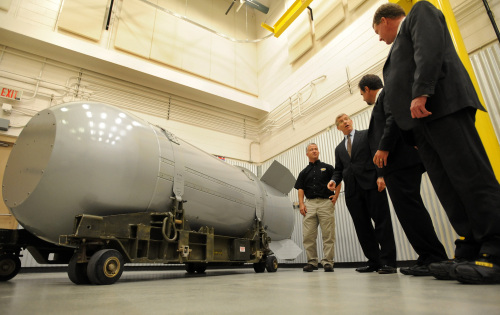AMARILLO, Texas (AP) — The last of the nation's most powerful nuclear bombs — a weapon hundreds of times stronger than the bomb dropped on Hiroshima — is being disassembled nearly half a century after it was put into service at the height of the Cold War.
 |
A weapons trainer talks to, from left, Daniel Poneman, Deputy Secretary of Energy, Steve Erhart, Pantex Site Office Manager, and John Woolery, B&W Pantex General Manager about an inert non-nuclear B53 training weapon during an event commemoration the dismantling of the final B53 nuclear bomb at the Pantex Plant in Amarillo, Texas, Tuesday, Oct. 25, 2011. (AP-Yonhap News) |
The final components of the B53 bomb will be broken down Tuesday at the Pantex Plant near Amarillo, the nation's only nuclear weapons assembly and disassembly facility. The completion of the dismantling program is a year ahead of schedule, according to the U.S. Department of Energy's National Nuclear Security Administration, and aligns with President Barack Obama's goal of reducing the number of nuclear weapons.
Thomas D'Agostino, the nuclear administration's chief, called the bomb's elimination a "significant milestone."
Put into service in 1962, when Cold War tensions peaked during the Cuban Missile Crisis, the B53 weighed 10,000 pounds and was the size of a minivan. According to the American Federation of Scientists, it was 600 times more powerful than the atomic bomb dropped on Hiroshima, Japan, killing as many as 140,000 people and helping end World War II.
The B53 was designed to destroy facilities deep underground, and it was carried by B-52 bombers.
With its destruction, the next largest bomb in operation will be the B83, said Hans Kristensen, a spokesman for the Federation of American Scientists. It's 1.2 megatons, while the B53 was 9 megatons.
The B53's disassembly ends the era of big megaton bombs, he said. The bombs' size helped compensate for their lack of accuracy. Today's bombs are smaller but more precise, reducing the amount of collateral damage, Kristensen said.
ince the B53 was made using older technology by engineers who have since retired or died, developing a disassembly process took time. Engineers had to develop complex tools and new procedures to ensure safety.
"We knew going in that this was going to be a challenging project, and we put together an outstanding team with all of our partners to develop a way to achieve this objective safely and efficiently," said John Woolery, the plant's general manager.
Many of the B53s were disassembled in the 1980s, but a significant number remained in the U.S. arsenal until they were retired from the stockpile in 1997. Pantex spokesman Greg Cunningham said he couldn't comment on how many of the bombs have been disassembled at the Texas plant.
The weapon is considered dismantled when the roughly 300 pounds of high explosives inside are separated from the special nuclear material, known as the pit. The uranium pits from bombs dismantled at Pantex will be stored on an interim basis at the plant, Cunningham said.
The non-nuclear material and components are then processed, which includes sanitizing, recycling and disposal, the National Nuclear Security Administration said last fall when it announced the Texas plant's role in the B53 dismantling.
The plant will play a large role in similar projects as older weapons are retired from the U.S.'s nuclear arsenal.
<한글기사>
냉전 유물 B53 핵폭탄, 반세기만에 해체
히로시마에 투하된 원자폭탄보다 위력이 수백배나 강력해 냉전 시대의 절정기에 도입됐던 미국의 핵폭탄 B53이 반세기만에 완전 해체된다.
미국 에너지부에 따르면 마지막 남은 B53 폭탄이 25일(현지시간) 미국 유일의 핵무기 조립·해체 시설인 텍사스주 애머릴로의 팬텍스 공장에서 해체작업과 함께 역사의 뒤안길로 사라진다.
해체 프로그램은 핵무기 수를 줄이려는 버락 오바마 대통령의 목표에 맞춰 애초 계획보다 1년 빨리 마무리되는 것이다.
B53 폭탄은 쿠바 미사일 위기로 냉전의 긴장이 최고조에 달했던 1962년 처음 만 들어진 것으로 1천파운드(약 454㎏) 무게에 크기는 미니밴만하다.
미국 과학자연맹(FAS)에 따르면 이 폭탄은 2차대전 당시 일본 히로시마에 떨어 진 원자폭탄보다 파괴력이 600배 강하다.
B53 폭탄은 지하 시설을 공격하기 위해 고안됐으며 B-52 폭격기로 투하된다.
다수의 B53폭탄은 1980년대에 해체됐으나 상당수는 비축물량에서 퇴역한 1997년 까지 남아있었다.
이 폭탄은 낡은 기술로 만들어졌으며 제조 당시의 엔지니어들이 죽거나 은퇴했 기 때문에 안전을 기하기 위해 복잡한 도구와 새로운 절차를 고안하느라 해체하는데 시간이 걸렸다.
폭탄 해체는 내부에 있는 약 300파운드(약 136㎏) 무게의 고성능 폭약과 피트(p it)라 불리는 특수 핵물질을 분리하는 작업으로 진행된다.








